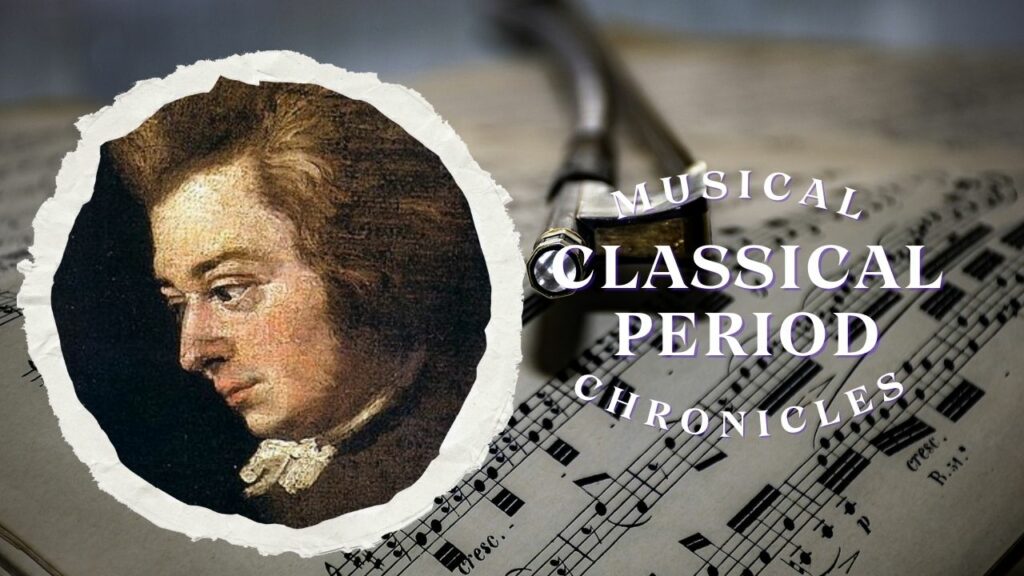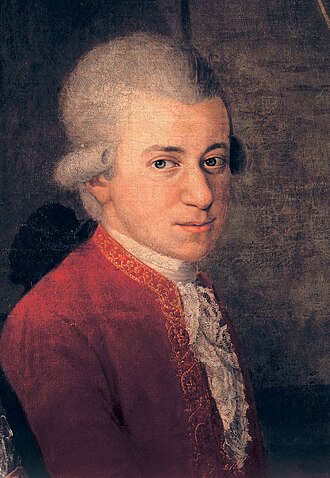
Wolfgang Amadeus Mozart (1756-1791)
The Discordant Symphony of Mozart’s Struggles
In the hallowed echoes of 18th-century Vienna, where the grandeur of classical music reached its zenith, a dissonant note lingered beneath the splendid cadence. Wolfgang Amadeus Mozart, the prodigious maestro, stood at the epicenter of a plethora of struggles—financial discord, the intoxicating allure of excess, and the crescendo of a formidable ego.
As the glittering lights of Vienna’s opulent theaters bathed Mozart in a luminescent glow, the shadows of unpaid debts and financial hardships danced in the background. Despite composing some of the era’s most enchanting melodies, the composer found himself ensnared in the dissonance of economic woes. The sweet strains of his compositions were often drowned by the cacophony of creditors’ demands, creating a stark contrast between artistic brilliance and the harsh realities of life.
Mozart, with his unparalleled genius, waltzed through the salons of the elite, crafting musical masterpieces that would endure for centuries. Yet, behind the velvet curtains, the orchestra of his life played to a different rhythm—one that resonated with the struggle for financial stability. Thus, we are invited into the paradox of Mozart’s world, where brilliance and hardship coexisted, creating a narrative that transcends the polished façade of classical opulence.
Step into the dimly lit streets of Vienna, where the clinking of coins and the haunting strains of unpaid bills form the backdrop to Mozart’s artistic fervor. The journey through this episode promises to unravel the intricacies of a musical genius, laying bare the challenges that tested his mettle and fueled the fires of artistic creation. The discordant symphony of Mozart’s struggles awaits, and the overture beckons us to explore the interplay between the genius of composition and the harsh crescendos of life’s demands.
The Melodic Prelude of Mozart’s Early Life

Wolfgang Amadeus Mozart, born on January 27, 1756, in the baroque splendor of Salzburg, Austria, emerged into a world teeming with musical legacy. His father, Leopold Mozart, a court composer and violinist, recognized the prodigious talent within his son at an early age. The overture of Mozart’s life commenced with the strains of a childhood spent in the embrace of musical education.
From his tender years, Mozart displayed an uncanny aptitude for music, mastering the keyboard and violin with unparalleled proficiency. Leopold, astounded by the precocity of his son’s abilities, became both mentor and manager, shepherding young Wolfgang and his sister Nannerl across the courts of Europe. The melodies of Mozart’s youth resonated with the echoes of royal palaces, where the young prodigy dazzled monarchs and aristocrats with his virtuosity.
The Mozart family’s itinerant existence, a sojourn through the glittering courts of Munich, Vienna, and Paris, served as both a crucible and a coronation. As Mozart’s compositions flowed from his pen, the symphony of his early life became entwined with the grandeur of European aristocracy. The brilliance of his talent illuminated the dimly lit salons, earning him accolades and commissions that hinted at the greatness yet to unfold.
Yet, even amidst the opulence, a subtle dissonance took root. The stringent demands of courtly expectations, coupled with the nomadic nature of their journey, sowed the seeds of restlessness in Mozart’s soul. The strains of his burgeoning genius were accompanied by the unrelenting pressure to conform to societal norms—a tension that would echo throughout his life.
As we delve into the opening movement of Mozart’s story, the music of his early years unfolds like a sonata, each note a testament to the duality of his existence. The resplendent melodies composed in the grandeur of courts were juxtaposed with the understated undertones of a childhood spent navigating the complexities of aristocratic patronage.
In the parlors of Vienna and the salons of Paris, the young composer honed his craft, laying the foundations for the symphonies that would resonate across centuries. The early life of Mozart, like a musical prelude, beckons us to explore the nuances of his burgeoning genius, setting the stage for the harmonies and discords that would define the maestro’s adult years.
We interrupt your regular programming for a special news bulletin.
A Crescendo of Turmoil in Vienna
Good evening, ladies and gentlemen. In the heart of 18th-century Vienna, a city known for its opulence and cultural fervor, the symphony of daily life has been disrupted by a crescendo of turmoil.
Reports from the city’s cobblestone streets suggest that Vienna, a haven for musicians and artists, is facing a discordant chapter. As the aristocracy revels in the sonatas echoing through grand concert halls, an undercurrent of tension simmers beneath the veneer of cultural sophistication.
Amidst the gilded salons and extravagant balls, the economic strains on both the privileged and the struggling artists have become increasingly impalpable. Unpaid debts and financial woes orchestrate a dissonant melody, creating a counterpoint to the refined compositions resonating in the concert halls. It appears that even the illustrious Wolfgang Amadeus Mozart, celebrated for his musical genius, is not immune to the economic tumult playing out in the city.
Rumors abound that despite his prodigious talent, Mozart finds himself entangled in the web of financial difficulties. The same composer who captivates audiences with his enchanting melodies is grappling with the harsh realities of unpaid bills and creditors knocking at his door. Vienna, usually a sanctuary for artistic expression, now echoes with the strains of economic discord.
This interruption serves as a stark reminder that behind the glittering façade of Vienna’s cultural ascendancy, the daily struggles of its inhabitants persist. The societal harmony championed by the aristocracy coexists with a counter-harmony, where artists, even those as illustrious as Mozart, navigate the tumultuous waters of financial insecurity.
And now, back to our regular programming.
Harmonizing Life’s Contradictions
Welcome back to the unfolding narrative of Wolfgang Amadeus Mozart, where the interruptions of life in 18th-century Vienna only serve to deepen the complex symphony of the maestro’s struggles.
As the curtain rises once more on the intricate tableau of Mozart’s existence, we find ourselves back in the resplendent salons of Vienna, where the composer’s life unfolds like a complex sonata. The melodies of artistic brilliance intertwine with the dissonant undertones of financial strife, creating a rich menagerie that defies simplicity.
In the wake of the news flash, the rhythm of Mozart’s daily life undergoes a subtle shift. The lavish soirées and opulent gatherings lose some of their luster as the reality of financial entanglements encroaches upon the maestro’s creative sanctum. Yet, true to his nature, Mozart, with an air of nonchalance, continues to compose the enchanting melodies that have earned him admiration across Europe.
The glittering world of Vienna’s elite offers a stark contrast to the financial challenges that Mozart faces. The aristocracy, with their lavish patronage and grandiloquent celebrations, seems a world away from the modest dwelling where Mozart, with quill in hand, confronts the ever-growing stack of unpaid bills. The dichotomy of his existence becomes more pronounced, reflecting the paradoxical nature of an artist navigating the currents of privilege and adversity.
Amongst the societal expectations and financial constraints, Mozart’s genius remains undiminished. His compositions, whether performed in the grand concert halls or the more intimate settings of Viennese salons, continue to captivate audiences. The notes that emanate from his pen are not just a symphony of sound but a testament to resilience—a defiance against the clamor of economic challenges.
Yet, the relentless pursuit of artistic excellence takes its toll. The shadows of financial insecurity cast a pall over Mozart’s daily life, leaving him oscillating between moments of creative euphoria and the harsh realities of economic instability. In the grand opera of Vienna, where opulence and artistry collide, Mozart stands as a maestro whose life composition transcends the boundaries of mere musical notes.
As we navigate the corridors of Mozart’s world, we witness the intricacies of a man whose melodies resound across the ages but whose footsteps echo in the corridors of economic turmoil. The harmonious and discordant elements of his life interweave, creating a narrative that resonates not only with the audiences of his time but with those who, centuries later, seek to understand the complexities of artistic genius.
We have been allowed to peer behind the curtain of Mozart’s public persona, revealing the nuanced interplay between his extraordinary musical prowess and the everyday struggles that define his human experience. The melody of his life continues, each note imbued with the paradoxes of privilege and the poignant strains of financial adversity.
Harmony Rediscovered: Mozart’s Legacy and the Prelude to Beethoven
In the final movement of Mozart’s narrative, the threads of financial discord begin to unravel, revealing a resolution that, while not immune to the strains of life’s challenges, restores a semblance of equilibrium to the maestro’s world. As the composer emerges from the shadows of economic uncertainty, his legacy takes on new dimensions, transcending the confines of financial disturbance.
Wolfgang Amadeus Mozart, a figure whose life has been both a symphony and a struggle, finds solace in the enduring power of his music. The Viennese air may still be tinged with the echoes of unpaid bills and economic woes, but Mozart’s compositions soar above the mundane concerns of the material world. The transformative nature of art becomes the bedrock upon which Mozart rebuilds the melodies of his life.
The financial clouds that once loomed ominously over Mozart’s existence begin to disperse, allowing glimpses of a clearer sky. Through a combination of renewed patronage, successful performances, and the sheer magnetism of his musical genius, Mozart finds himself on more stable ground. The cacophony of economic uncertainty begins to fade into the background, making way for the resounding chords of artistic triumph.
As Mozart’s financial situation stabilizes, he rediscovers a sense of artistic liberation. The weight of economic constraints, while not entirely lifted, no longer stifles the creative impulses that flow from the depths of his soul. The compositions that emerge during this period reflect a newfound resilience—an ability to transcend the material struggles and give voice to the ineffable beauty of the human experience.
In accordance to the harmonious resurgence of Mozart’s artistic pursuits, the city of Vienna bears witness to a maestro reclaiming his musical throne. The concert halls, once overshadowed by the dissonance of financial worries, now resonate with the sublime strains of compositions that echo through time. Mozart’s legacy, it seems, is not just a collection of notes on parchment but a testament to the enduring power of creativity to transcend the limitations of circumstance.
And so, as we bid adieu to the tumultuous chapter in Mozart’s life, we turn our gaze toward the next episode in the grand symphony of musical history. Ludwig van Beethoven, a revolutionary force in the annals of classical music, waits in the wings. The transition from Mozart to Beethoven is not just a chronological shift but a dynamic interplay of artistic evolution.
Join us in the next episode as we delve into the life and times of Beethoven—a composer whose journey is marked by innovation, rebellion, and a relentless pursuit of musical expression. The baton passes from Mozart to Beethoven, promising a continuation of the musical odyssey that transcends the boundaries of time and resonates with the eternal cadence of human creativity.
Return to the Classical Period Chronicles home page.
